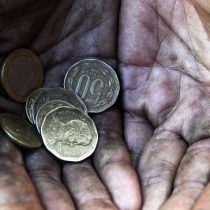
The worst pandemic in more than a century is causing a tough setback in one of the most significant socioeconomic struggles ever waged in Latin American history such as poverty reduction. If we look at our region, it seems undeniable that the economic effects of the pandemic will not only translate into higher unemployment, but also significant increases in poverty levels, not only in Chile, but across the continent. Julio Berdegué, deputy director of the Food and Agriculture Organization of the United Nations (FAO)—said: “We are going to have a historic setback in the fight against hunger, no doubt. I think that’s already quite inevitable.” FAO itself estimates that we could see an unseen increase in poverty in the region of up to 20 million people who would join the 43 million already in existence before COVID-19 and were already in this woeful condition. Thus, hunger in Latin America lurks around the corner.
The situation in Chile may be just as daunting. The OECD already mentioned, in early March, that 53% of Chileans could be at risk of falling into poverty if they stop receiving their income for three months. That scenario now seems to be a possible reality to which a lot of people can pass during this year. ECLAC has predicted that nearly one million Chileans could fall, this year alone, under the poverty line resulting from the double economic shock of the 18-O social outburst and the effects of the pandemic. ECLAC estimates that the population that could live under this poverty line could climb to approximately 14% this year. However, these numbers suggest an unprecedented trend shift in the country’s poverty levels. For the first time since the return of democracy, poverty in Chile will increase rather than decline. While these numbers are terrifying in themselves, as there is nothing more painful than seeing so many fellow citizens in poverty, they also suggest two important things that deserve to be recognized for our discussion of the future of the country.
First, we must recognize that, since the early 1990s, Chile has been the most successful country in the region to reduce poverty, doing so persistently and systematically for nearly three decades. In the last thirty years—yes, those vilified thirty years that many people now seem to abhor —poverty in Chile has declined dramatically, from 68% of the population to 8.6% in the last measurement made in 2017. It is then incomprehensible that those people who in October ripped out garments indicating that those 30 years had been an illusion or a “neoliberal” mirage and that we should therefore slit our model of development (without recognizing the country’s achievements in poverty reduction) are the same “deconstructivists of the model” as today , as if nothing, they tear garments remembering—go paradox! —the existence of poverty and hunger in Chile. It seems that the logical, argumentative and moral consistency of political-economic discourses is scarce in the country.
Similarly, while on the southern periphery of Santiago there were demonstrations related to the food and economic problems associated with quarantines, the word ‘HAMBRE’ was projected in Providencia. Taking advantage of this aesthetic moment, those who in October wanted to demolish the economic model and denied (or silenced) their achievements in poverty reduction came ipso facto on social media to put the fair cry in the sky. “The people are hungry” immediately became the new slogan that replaced “there are 30 pesos, it is 30 years”; without anyone noticing the irony or inconsistency of such an unexpected slogan change.
The paradox of this sudden shift in focus is that neither vulnerability nor poverty—which has been dragging on for more than twenty years in many sectors of the country—had really been a serious focus of attention from the country’s progressive sectors. Rather, all those social paladins, who are now protesting and vociferous against hunger, were decades concerned with post-material problems that appear to be more relevant in Finland than in Chile. In fact, if we look at the slogans raised by many before and during the 18-O movement, we can notice repeated demonstrations in favor of LGBT rights, movements against the rodeo and many others in favor of veganism, the use of psychotropics and anti-specism. However, we have not seen anyone speak out in Plaza Italia for decades against the vulnerability and poverty suffered by many compatriots every day. If it seemed even that a few months ago, even a 17-year-old Swedish girl named Greta Thunberg cared and cared more about Chileans than all the actions put together to eradicate poverty. All this suggests, perhaps, that this shift in focus may be rather an opportunistic instrumentalization of a reality that we had simply decided to ignore, rather than a real concern for our fellow citizens and the state of poverty.
Second, this return of poverty and hunger to public debate helps us to recognize that poverty has never really been completely eradicated from Chile and that our successful discourses regarding the decline of chile seem to be a little undahed. In other words, the return of poverty should make us more humble about our exitist discourses on the country’s economic development and should also nuance our successful discourses on poverty itself. We had been under the false conviction that poverty and hunger were things from a remote past and that they had ceased to be problems that deserved our attention. Indeed, the rise of redistributive and social debates such as those related to free university education and economic inequality are symptomatic of a caring population who believed that camps, common pots and poverty were problems and realities already overcome that deserved neither our attention nor our scarce public resources. But this deception and complacency have been sadly exposed in just months of circulation of the virus.
Yet the return of vulnerability and poverty is not the return of a ghost from a forgotten past, but rather seemed to be a more abrupt way to awaken both from our complacency, and to believe that we possessed a state of greater progress and well-being than we actually had. The return of poverty gives us a hard and sad message, but perhaps also necessary: we are a much less rich and much poorer and more fragile country than we thought we were, and therefore we should never forget the fundamental role of economic growth again in fighting misery. The pandemic has not only made clear the fragility of our development and our successful discourse on poverty, but also, as ever before, the prevailing need to put a focus on constant economic growth as the only serious and sustainable way to eradicate national poverty.
It is to be hoped that political forces in all sectors, civil society and all citizens in a cross-cutting way will be able to overcome existing dogmas and animadversions so that they can join the widespread call of the Presidency and other public figures in order to return to dialogue and to be able to build a post-pandemic social and economic agenda that will help us return to the lost course of progress productivity and economic growth. As Adam Smith warned , “there cannot be a flourishing and happy society when most of its members are poor and unhappy,” so the time to act and take up that path of economic growth of the past thirty years is exhausted, the reality of poverty has unfortunately knocked on us again.
The content poured into this opinion column is the sole responsibility of its author, and does not necessarily reflect the editorial line or position of El Mostrador.





